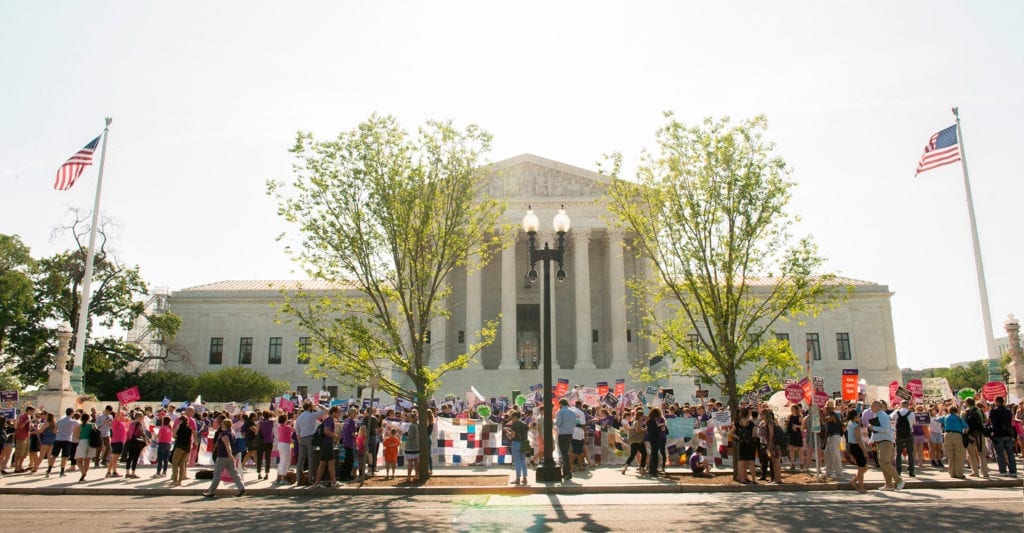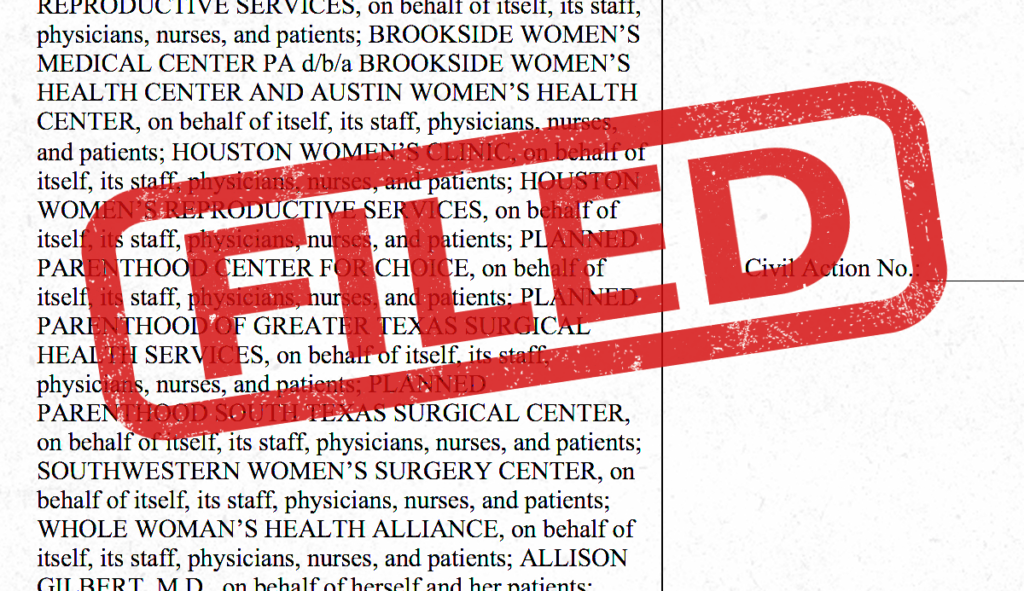Center Asks U.S. Supreme Court to Block Texas Law That Would Prohibit Almost All Abortion Care in the State
Law due to take effect September 1 would ban abortion care after six weeks of pregnancy and incentivize individuals to sue abortion providers and “aiders and abettors.”

The Center for Reproductive Rights and its partners today filed an emergency request with the U.S. Supreme Court to block Texas’s radical new abortion ban before it takes effect September 1. The law, S.B. 8, bans abortion after approximately six weeks of pregnancy, prohibiting almost all abortion care in the state. It also incentivizes private individuals—including anti-abortion activists—to seek monetary penalties by suing anyone who provides abortion care or assists someone in obtaining care in the state.
The action came after the Fifth Circuit Court of Appeals on August 29 denied the plaintiffs’ request to block the law. The Fifth Circuit also paused district court proceedings and refused to take any action to prevent the ban from going into effect.
“In less than two days, Texas politicians will have effectively overturned Roe v. Wade,” said Nancy Northup, president and CEO of the Center. “We have filed an emergency motion in the Supreme Court to block this law before clinics are forced to turn patients away. Patients will have to travel out of state – in the middle of a pandemic – to receive constitutionally guaranteed healthcare. And many will not have the means to do so. It’s cruel, unconscionable, and unlawful.”
The plaintiffs’ emergency request asks the Supreme Court to block the law or allow district court proceedings to continue. The district court, on August 25, had denied the defendants’ motion to dismiss the case challenging the Texas law brought by the Center and its partners on July 13.
If the law takes effect September 1, almost all abortion services will cease in Texas—since approximately 85-90% of people who obtain abortions in Texas are at least six weeks into pregnancy.
S.B. 8 Provides $10,000 Incentive for Individuals to “Enforce” Texas Abortion Ban
Under S.B. 8, anyone who successfully sues a health center worker, an abortion provider, or any person who helps someone access abortion after six weeks will be rewarded with at least $10,000, to be paid by the person sued.
Lawsuits may be filed against a broad range of people—considered by the law to be “aiders and abettors”— including a person who drives their friend to obtain an abortion; abortion funds providing financial assistance to patients; health center staff; and a member of the clergy who counsels or assists an abortion patient.
People who successfully defend themselves from such lawsuits, however, are prohibited under S.B. 8 from recovering their fees and costs.
“This radical law will isolate people seeking to exercise their constitutional right to abortion care by targeting their entire support network and discouraging their loved ones from providing help and support for fear of being sued,” said Marc Hearron, Senior Counsel at the Center. “This is just the latest attempt by Texas politicians to ban abortion, but this time they’ve gone to a new extreme.”
Anti-abortion groups in Texas have already set up online forms enlisting people to sue anyone they believe is violating the law and encouraging people to submit “anonymous tips” on doctors, clinics, and others who violate the law. The law was designed to attempt to evade legal accountability in court, since it shifts enforcement from state officials to private individuals.
Texas Has Dozens of Restrictions on Abortion Access
Abortion is already extremely difficult to access in Texas. Restrictions have forced health centers to close and have pushed access out of reach for many. If this law is allowed to take effect, the average one-way driving distance for pregnant Texans seeking an abortion would increase 20-fold, from 12 miles to 248 miles, according to new research from the Guttmacher Institute.
As with other abortion restrictions, S.B. 8 would disproportionately harm people who already face discriminatory obstacles to accessing health care including people of color, those living on low incomes, and those in rural areas. People struggling to make ends meet must often delay care to secure funds, and Texas prohibits coverage of abortion care through its Medicaid program and in nearly all private insurance plans.
Other Texas abortion restrictions include state-mandated biased counseling, a 24-hour mandatory delay that forces patients to make two trips to the clinic and shoulder additional costs, a ban on the use of telemedicine for abortion, and a parental consent requirement.
About Whole Woman’s Health et al. v. Jackson et al.
On July 13, the Center, Planned Parenthood Federation of America, the American Civil Liberties Union, the ACLU of Texas, the Lawyering Project, and Morrison & Foerster LLP brought the case, Whole Woman’s Health et al. v. Jackson et al., on behalf of the plaintiffs: Texas abortion providers led by Whole Woman’s Health, doctors, clinic staff, abortion funds, support networks, and clergy members.
Defendants in the lawsuit include parties that would have an enforcement role in S.B. 8: every state court trial judge and clerk in Texas, the Texas Medical Board, the Texas Board of Nursing, the Texas Board of Pharmacy, the attorney general, and Mark Lee Dickson, Director of Right to Life East Texas, an individual who has threatened to sue under the new law.
Read more:


